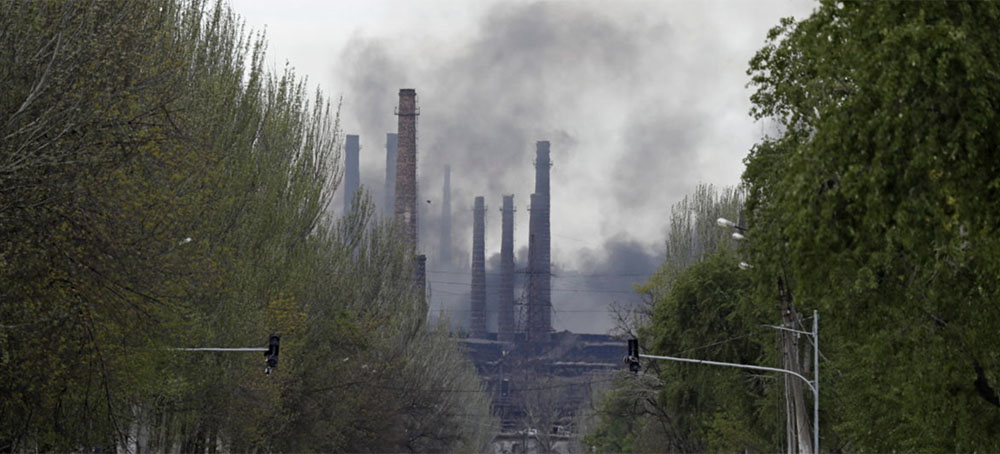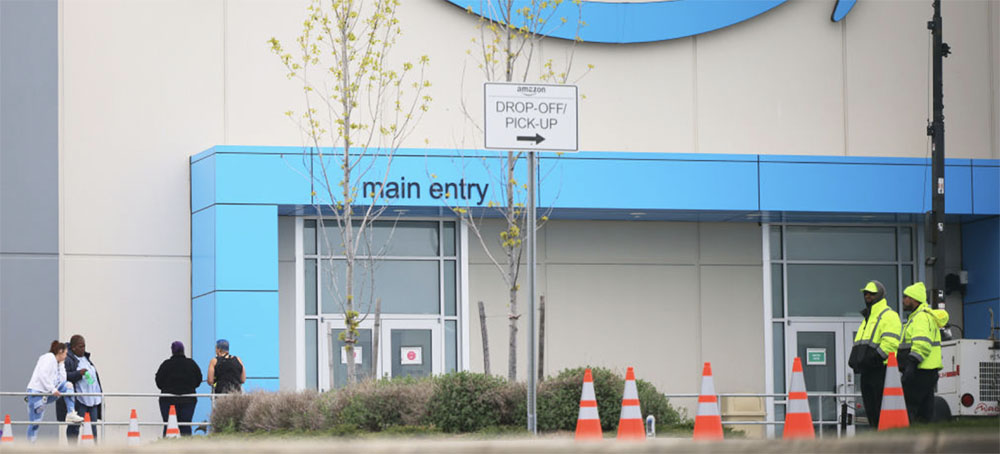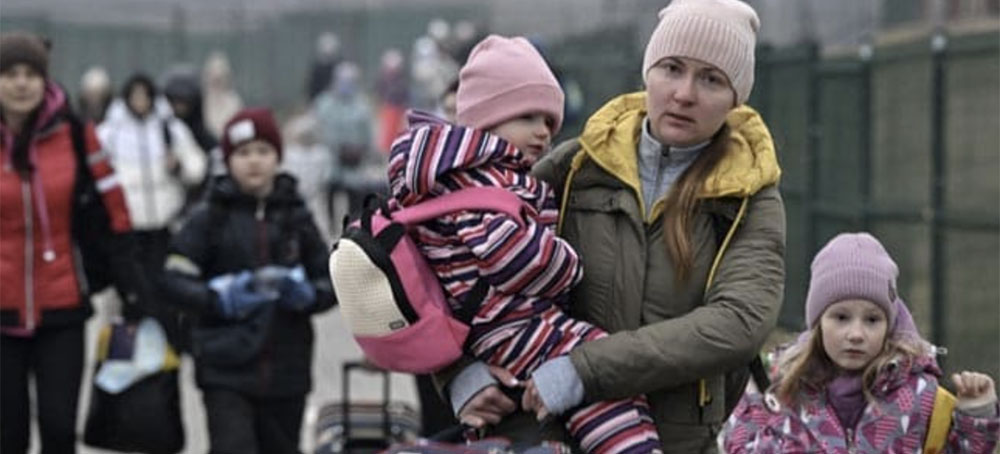Live on the homepage now!
Reader Supported News
The article below is satire. Andy Borowitz is an American comedian and New York Times-bestselling author who satirizes the news for his column, "The Borowitz Report."
“When I met with Justice Kavanaugh before his confirmation hearings, he looked me in the eye and said that he considered Roe v. Wade the law of the land,” she said. “Nothing in his confirmation hearings suggested that he would ever be less than trustworthy with a woman.”
“As I watched his Senate testimony, I felt even more confident that he had told me the truth,” she added. “His utter respect for a woman’s right to make decisions for herself came shining through.”
In the aftermath of the leaked Supreme Court draft ruling and reports that Kavanaugh voted to overturn Roe v. Wade, however, Collins is reassessing her ability to tell whether someone is lying to her. “My conduct in this matter has left me troubled and concerned,” she said.
 A crowd of people gather outside the Supreme Court early today in Washington. (photo: Brendan Smialowski/AFP/Getty Images)
A crowd of people gather outside the Supreme Court early today in Washington. (photo: Brendan Smialowski/AFP/Getty Images)
“A vote on this legislation is not an abstract exercise, this is as urgent and real as it gets,” Schumer said in a floor speech on Tuesday morning, following Politico’s Monday night reporting of the draft, which NPR has not been able to verify and could change before the final version comes out this summer. “We will vote to protect a woman's right to choose and every American is going to see which side every senator stands.”
Any such vote would be symbolic. Democrats control the Senate but only hold half the seats, and they can’t muster the 60-vote supermajority needed to pass the law that Schumer suggested.
Some senators, including Bernie Sanders of Vermont, have called to eliminate the filibuster’s supermajority rules to pass a law to protect abortion rights with a simple majority vote. Democrats do not have the support from within the party for such a tactical move, as two centrist senators — Kyrsten Sinema of Arizona and Joe Manchin of West Virginia — are opposed to changing any filibuster rules without bipartisan support.
During his floor speech, Schumer made a plea to Americans to lobby their members of Congress in support of abortion rights.
“To the American people, I say this: the elections this November will have consequences because the rights of 100 million women are now on the ballot. To help fight this court's awful decision, I urge every American to make their voices heard this week and this year,” he said.
Schumer also repeated his accusation that conservative justices “lied” to the Senate in the course of their confirmations regarding their views on whether the Roe decision was settled precedent. Senate Minority Leader Mitch McConnell has denounced the leak but not commented on substance of the apparent draft decision, which could change before the Supreme Court officially issues its ruling.
 Abortion rights advocates and anti-abortion advocates demonstrate outside the Supreme Court on Tuesday. (photo: Jabin Botsford/The Washington Post)
Abortion rights advocates and anti-abortion advocates demonstrate outside the Supreme Court on Tuesday. (photo: Jabin Botsford/The Washington Post)
ALSO SEE: What Are 'Trigger' Laws
and Which States Have Them?
On the Hill
Abortion debate now promises to consume Washington ahead of midterms
The bombshell revelation on Monday night that the Supreme Court is preparing to strike down Roe v. Wade promises to consume Washington in the months ahead and reorder the midterm elections.
A draft opinion obliterating Roe was obtained by Politico’s Josh Gerstein and Alexander Ward. “Roe was egregiously wrong from the start,” Justice Samuel Alito wrote in the draft opinion.
Our colleagues Robert Barnes and Mike DeBonis called the disclosure of an unpublished draft opinion “an extreme breach of modern Supreme Court protocol,” while noting there was still time for the draft and the votes of the justices who signed onto it to change.
Strategists in both parties were already preparing for the possibility that the court would weaken or do away with Roe in late June or early July when the court's current term ends — but the leaked draft accelerated the timetable in a dramatic fashion.
Democrats immediately argued the expected ruling was reason for concerned voters to support the party in November's elections.
“Republicans just gutted Roe v Wade, the Constitution’s guarantee of reproductive freedom, and will ban abortion in all 50 states, if they take over Congress,” Rep. Sean Patrick Maloney (D-N.Y.), the chairman of the Democratic Congressional Campaign Committee, tweeted. “Only Democrats will protect our freedoms. That is now the central choice in the 2022 election.”
House Speaker Nancy Pelosi (D-Calif.) and Senate Majority Leader Chuck Schumer (D-N.Y.) took aim at conservatives on the Supreme Court, without naming them, who testified during their confirmation hearings that they respected court precedents.
“Several of these conservative Justices, who are in no way accountable to the American people, have lied to the U.S. Senate, ripped up the Constitution and defiled both precedent and the Supreme Court’s reputation — all at the expense of tens of millions of women who could soon be stripped of their bodily autonomy and the constitutional rights they’ve relied on for half a century,” they wrote in a statement.
Midterm impact
The draft opinion threatens to upend the midterms in unpredictable ways.
Some Democrats argued overturning Roe would energize the party's base of voters as well as some independent voters who until this point were less enthusiastic than Republicans about turning out to vote this year.
“It's another reminder of just how much Donald Trump's victory in 2016 changed the trajectory of our country. Stopping his reelection became the single biggest reason Democrats turned out in 2020, and they will have similar impact on the midterms,” Richard Luchette, a Democratic strategist, said.
A former Republican Senate aide was more skeptical of Democrats benefiting.
“Does this motivate married suburban women for the Democrats five months post decision against a backdrop of war in Europe, high gas prices, education issues, and rampant illegal immigration? I don't think so,” the former aide said. “This will also motivate the conservative base in an election where Trump isn't on the ballot — although the base is already very motivated.”
A Democratic operative working on House races, who like others spoke on the condition of anonymity to discuss party strategy, said every Republican lawmaker and candidate running in a battleground state or district will be asked to weigh in, much as they were grilled on some of Trump’s most incendiary comments.
“This is going to change the dynamic of the midterms in a way that if I were [House Minority Leader] Kevin McCarthy I would be not happy about,” said the operative.
Still, the operative cautioned, Democrats would need to be careful in some swing districts to refrain from alienating voters with moderate views on abortion. They should consider echoing former president Bill Clinton’s line that abortion should be “safe, legal and rare,” the operative recommended.
Adam Jentleson, a former top Democratic Senate aide, previewed the party’s message in Senate races in a tweet Monday night: “If Democrats lose the Senate, [Senate Minority Leader Mitch] McConnell will block any SCOTUS appointment that may arise in the next two years.”
The news could also lead to a surge in fundraising for both parties. On Monday night, Democrats pulled in more than $700,000 over a tweet already raising hundreds of thousands of dollars through their ActBlue platform.
Some progressives, including Sen. Bernie Sanders (I-Vt.), Kirsten Gillibrand (D-N.Y.) and Elizabeth Warren (D-Mass.), immediately called for abolishing the filibuster to allow Democrats to pass legislation enshrining the right to abortion. But Democrats tried and failed to change the filibuster earlier this year to pass a voting rights bill, and there's no reason to think such an effort could succeed now.
Other Democrats revived calls for expanding the Supreme Court so President Biden could nominate more liberal justices.
Republican response
Republicans, meanwhile, while praising the draft decision, focused their response on the leak itself, which they argued would further damage the court's legitimacy.
“The Supreme Court & the DOJ must get to the bottom of this leak immediately using every investigative tool necessary,” Sen. Tom Cotton (R-Ark.) tweeted.
If the Supreme Court overturns Roe, Democrats are likely to receive the decision much differently than they would've a decade or two ago, when more Democratic lawmakers who opposed abortion were in office.
House Democrats demonstrated the party's almost unanimous embrace of abortion rights in September when they passed for the first time legislation to codify a woman's right to an abortion. Just one Democrat — Rep. Henry Cuellar (Texas) — voted against.
The measure failed in the Senate in February, with Sen. Joe Manchin (D-W.Va.) and both Republican senators who support abortion rights, Sens. Lisa Murkowski (Alaska) and Susan Collins (Maine) voting against it. Murkowski and Collins later introduced their own bill codifying Roe and a later case, Planned Parenthood of Southeastern Pennsylvania v. Casey, into law.
The campaign
Ohio voters head to the polls, testing Trump's sway in a crowded primary

Happening today: "Trump’s sway over Republicans in this year’s midterms will be tested in a crowded primary for the U.S. Senate in Ohio — one of two states where voters are heading to the polls,” our colleagues Annie Linskey and David Weigel report.
- “Republican primary voters will select their nominee to fill an open Senate seat from a group that includes a candidate backed by Trump, three others who have touted ties to him and one who has rejected the former president’s false claims that the 2020 election was stolen.”
- “Other primaries for governor and the U.S. House are expected to send early signals about the direction each party is headed leading up to the November election. Voters in Indiana will also go to the polls” today.
On K Street
Ukraine adds a lobbying firm
First in The Early: The lobbying firm Navigators Global has agreed to represent Ukrainian parliament’s national security, defense and intelligence committee’s interests in Washington.
The firm’s lobbyists will “advocate to key members of the U.S. Congress and the Biden Administration on our war and humanitarian requirements,” three Ukrainian lawmakers wrote in a letter last month to the lobbying firm, which was obtained by The Early.
The arrangement is a rare example of the Ukrainian government turning to K Street for help since the Russian invasion.
The arrangement grew out of the work the Republican lobbyist Phil Anderson, Navigators' president, has done with Ukraine Freedom Alliance, a nonprofit he and other Navigators lobbyists helped start after the war broke out to deliver aid to Ukraine. The nonprofit partnered with the UPS Foundation — UPS is a longtime Navigators client — to fly more than 64,000 pounds of food to Ukraine this week, according to Anderson and the foundation.
Anderson traveled twice to Ukraine as part of his work with the nonprofit, where he met Ukrainian lawmakers and agreed to lobby for them in Washington. The firm is working pro bono, Anderson said.
In an interview, Anderson said he and his team plan to lobby the House and Senate armed services and appropriations committees, along with Congressional leadership and the White House, on behalf of the Ukrainian lawmakers.
“The idea is to provide an additional voice in an effort to augment the great work that’s being done by the embassy,” he said.
On the move: The lobbying firm Invariant has hired Monica Matoush, who was previously a senior adviser to the Pentagon’s under secretary of personnel and readiness in the Biden administration and before that worked for the House Armed Services Committee.
Monument Advocacy has added Anna Nix Kumar, a former aide to Rep. Rick Crawford (R-Ark.), to its public affairs practice. And Kate Childs Graham, who was Vice President Harris’ director of speechwriting, has returned to the consulting firm West Wing Writers.
At the White House
Warren seeks to up the pressure on Biden on student debt cancellation
A new academic study on who is impacted by student debt cancellation shows that cancelling $50,000 worth of student loan debts impacts significantly more people and helps to close the racial wealth gap. The study, conducted by five scholars from Princeton University and the University of California, Merced, and provided to the Early, is being touted by Sen. Elizabeth Warren, who has been pressuring the White House to cancel student loan debt.
After sustained pressure by many Democrats, including Schumer, Biden is considering student loan forgiveness, but as our colleague Jeff Stein reports, he indicated it would be less than $50,000. He is also considering income caps to ensure the wealthy don’t benefit.
Warren said the study shows that higher levels of debt cancellation is necessary for the lowest income borrowers to benefit. One-third of borrowers will have their debt zeroed out if $10,000 worth of debt is cancelled, compared to 76 percent of borrowers when $50,000 of loans are cancelled.
- “The more President Biden cancels, the more we narrow the racial wealth gap among borrowers and the bigger the boost to Americans' economic futures. This is the right thing to do,” Warren said in a statement to the Early 202.
The study also found that the more debt forgiven the more lower income Americans benefit. Eliminating $50,000 would reduce the number of people with student loans from 15 percent to 2 percent in the lowest economic quintile. In addition, it found that over one-third of borrowers owed more in student loans than they did twelve years prior, including 66 percent of Black borrowers.
The Data

Trump’s endorsements in the 2022 Republican primaries, visualized: “Trump is flexing his political influence in this year’s Republican primaries, backing his favored candidates in hotly contested statewide and congressional races,” our colleagues Youjin Shin, Courtney Beesch and Anu Narayanswamy write. “Trump has signaled that he believes the key to a potential run for president in 2024 is showing that he can still shape the GOP.”
- “Trump has thrown his support behind more than a dozen Senate candidates so far, with May primaries being the first test of his ability to lift trailing candidates to victory.”
Here are the candidates Trump endorsed in today’s Indiana and Ohio primaries:

The Media
What we’re reading:
- Slight majority say Trump should be charged with crime over Jan. 6 role, poll finds. By The Post’s Jacqueline Alemany and Scott Clement.
- Accusations against Rep. Madison Cawthorn multiply. By The Post’s Marianna Sotomayor, Leigh Ann Caldwell and Mike DeBonis.
- ICYMI: ‘You never forget it’: These are the stories of life before Roe v. Wade transformed America. By the 19th*’s Shefali Luthra.
Viral
The scene after last night’s bombshell:
 Mariupol steel plant. (photo: AP)
Mariupol steel plant. (photo: AP)
 LGBTQ rights rally. (photo: Getty Images)
LGBTQ rights rally. (photo: Getty Images)
It’s not just abortion. The logic of this draft decision would also apply to the decisions protecting same-sex marriage, contraception, and more.
Not only am I unsurprised—I predicted it, several times, in this publication. And not just me, of course, but everyone in my profession. Overturning Roe is in the Republican Party’s platform. It was the primary criterion that the Federalist Society, funded by religious extremists, used to pick Supreme Court justices for Donald Trump. Together with desegregation, it propelled the Religious Right to get into politics 50 years ago, and vote for Republicans ever since.
So, yes, we all told you this was inevitable. And now it is here.
But “you”—by which I mean the large majority of voters who say that women have a right to control their own bodies—didn’t listen. The Supreme Court ranked at the bottom of Democrats’ concerns in 2016, while it was at the top of Republicans’. Even after the unprecedented and norm-shattering mistreatment of judicial nominee Merrick Garland, many centrist voters didn’t care and some left-wing voters didn’t think it was enough to stomach voting for Hillary Clinton.
So we got Justices Gorsuch, Kavanaugh, and Barrett, and now, if this draft becomes the majority opinion, we’ve got the end of Roe v. Wade.
But that’s only the beginning of the end. If the reasoning of the draft becomes the majority opinion—and it is worth stressing that this is by no means assured, since it is a draft and may well be watered down by other justices—then it applies equally to Obergefell v. Hodges, which held that all marriages (including my same-sex one) are protected by the Constitution; to Lawrence v. Texas, which held that all intimate sexual activity (including same-sex) was too; and to Griswold v. Connecticut, which held that the right to access contraception is as well.
All those cases held that certain specific rights to bodily integrity and privacy, though unmentioned in the Constitution, are implicit in the broad guarantees of the 14th Amendment, as long as they were part of the “concept of ordered liberty.” It’s not part of the concept of liberty to police a woman’s uterus or a gay man’s bedroom. There are limits to government power, and no process can be “due process” if it transgresses those limits.
But in so-called Originalism, a once-fringe legal theory that is now the gospel of half the Supreme Court, a right must also be “part of the Nation’s history and traditions” to be protected. Sorry, women and gays, you’re not part of our white-male-dominated history and traditions, so the constitution doesn’t protect you.
To be clear, Justice Alito didn’t leave this to speculation. He specifically mentioned Obergefell and Lawrence as examples of the same faulty reasoning behind Roe.
So, in case folks weren’t listening when all those legal Cassandras warned that Roe was going to be overturned, please listen now: Gay marriage is too. Within a year or two. Unless another justice leaves the court, the constitutional right to marriage for all is going to be overturned. The only question is whether Republicans will have a veto-proof majority (or the presidency in 2024) to ban both abortion and gay marriage anywhere in the nation.
I’m not sure where that leaves my custody of my child, but I can tell you that I am certain that my family will not be protected by the Constitution two years from now.
So, what can liberals do now?
Not much, really. It’s too fucking late. What liberals should have done in 2016 was ensure that a Democrat won the oval office. They should have arm-twisted their Jill Stein friends, and let their Republican relatives know that, hey, women are people and shouldn’t be forced by the government to carry a fetus (or a blastocyst, or an embryo) inside of their womb. And that those very rights were at stake in 2016, and again in the Senate elections of 2018, and again in 2020, and again in the Senate elections this year.
Of course, I’m sure liberals will hold marches, because that’s what we like to do. March and rally and chant. We like to do things that give ourselves the illusion of power. That’s why liberals reduce their “carbon footprints,” even though that concept is a neo-liberal scam, invented by British Petroleum to dodge collective responsibility for climate change and place it on individuals instead. It’s why liberals think that occupying a public square is a “victory,” even if it accomplishes nothing.
The question is, will liberals continue to sublimate their rage into meaningless acts that make them feel better, or will they exercise actual power, by voting Democrats into office on local, state, and national levels, and by demanding that the desecration of the Supreme Court that took place during the Trump years (and the last of Obama’s) be corrected immediately, by changing the size of the court or enacting term limits or both?
And in the meantime, will liberals donate enough money to pro-abortion organizations so that every woman who wants one can travel to a state where her rights are still respected? Will moderate white women—looking at you, Susan Collins—finally realize that a party that sells out to Christian theocrats is not looking out for their best interests?
I’m ashamed to admit that I still have a little optimism here. As I’ve written before, I think the abortion case and the gun control case (don’t forget that one—half the nation’s gun safety laws are likely to be struck down too) have the capacity to energize two non-overlapping groups essential to the Democrats’ success: young progressives (especially people of color) and moderate white women. Without minimizing the gigantic practical and symbolic damage this decision will do on women across the country, I still have some flickering hope that it will also wake up enough people to make a difference in November.
In the meantime, all I can say to all of my female friends, as we watch your rights be stripped away by Christian extremists placed on the Supreme Court by other Christian extremists, is that I’ll be joining you soon. They’ve never accepted our full humanity, and now they’re putting us back in our places.
 Amazon focused its union-busting apparatus on the Staten Island LDJ5 sorting center following the successful union drive at the neighboring JFK8 facility. (photo: Michael M. Santiago/Getty Images)
Amazon focused its union-busting apparatus on the Staten Island LDJ5 sorting center following the successful union drive at the neighboring JFK8 facility. (photo: Michael M. Santiago/Getty Images)
 Russia-Ukraine War: Women and children are still pouring out of Ukraine. (photo: NDTV)
Russia-Ukraine War: Women and children are still pouring out of Ukraine. (photo: NDTV)
I can’t help wondering: Did Joe Biden send his secretaries of defense and state to Kyiv recently to show just how totally “into” the war in Ukraine his administration is? So into it, in fact, that it’s hard to express (not in weaponry, perhaps, but in words). Still, Secretary of Defense Lloyd Austin did make it clear enough that Washington’s objective in sending ever more weapons Kyiv’s way isn’t just to help defend the Ukrainians from a nightmarish aggression — not anymore. There’s a deeper purpose now at work — that being, as Austin put it, to ensure that Russia is eternally “weakened” by this war. In other words, the world is increasingly to be involved in a bad take two of the Cold War of the last century. And by the way, when it comes to actual diplomacy or negotiations, not a word was said in Kyiv, even with the secretary of state there.
At a moment when the Biden administration seems to be doubling down on the Ukraine conflict, TomDispatch regular Rajan Menon takes a hard look at just what that war is actually costing our world and, believe me, it’s a grim tale you don’t see told these days. Sadly, as the fighting goes on (and on and on), while Washington becomes ever more invested in that very ongoingness, the costs to the rest of us on this planet are only mounting.
And it’s not just a matter of pushing Vladimir Putin’s all-too-nuclearized back up against a wall or heading, as the Russian foreign minister recently put it, for a possible World War III. Keep in mind that focusing so totally on the crisis in Ukraine means again ensuring that the deepest peril to this planet, climate change, could take an eternal backseat to Cold War II.
And mind you, the war isn’t working out well domestically either. It’s already clear that, in the eyes of many Americans, Joe Biden will never be the “war president” they should rally around. Research suggests that most of us are, at best, “tepid” about his role in the war so far and split on what to make of his actions (as on so much else). And don’t count on the war helping the Democrats at the polls in November, not with inflation soaring. An increasingly chaotic planet that seems ever more out of control might put the Trumpists of the Republican Party in the saddle for years to come — yet another nightmare of the first order. With that in mind, consider with Rajan Menon just what a disaster the invasion of Ukraine is already proving to be for so many on this wounded planet of ours.
-Tom Engelhardt, TomDispatch
The Economic Consequences of the War
Why the Conflict in Ukraine Is a Disaster for the Poor of This Planet
Not surprisingly, following Russia’s February 24th invasion, coverage has focused mainly on the day-to-day fighting; the destruction of Ukrainian economic assets, ranging from buildings and bridges to factories and whole cities; the plight of both Ukrainian refugees and internally displaced people, or IDPs; and the mounting evidence of atrocities. The war’s potential long-term economic effects in and beyond Ukraine haven’t attracted nearly as much attention, for understandable reasons. They’re less visceral and, by definition, less immediate. Yet the war will take a huge economic toll, not just on Ukraine but on desperately poor people living thousands of miles away. Wealthier countries will experience the ill effects of the war, too, but be better able to cope with them.
Shattered Ukraine
Some expect this war to last years, even decades, though that estimate seems far too bleak. What we do know, however, is that, even two months in, Ukraine’s economic losses and the outside assistance that country will need ever to achieve anything resembling what once passed for normal are staggering.
Let’s start with Ukraine’s refugees and IDPs. Together, the two groups already make up 29% of the country’s total population. To put that in perspective, try to imagine 97 million Americans finding themselves in such a predicament in the next two months.
As of late April, 5.4 million Ukrainians had fled the country for Poland and other neighboring lands. Even though many — estimates vary between several hundred thousand and a million — have started returning, it’s unclear whether they will be able to stay (which is why the U.N.’s figures exclude them from its estimate of the total number of refugees). If the war worsens and does indeed last years, a continuing exodus of refugees could result in a total unimaginable today.
That will put even more strain on the countries hosting them, especially Poland, which has already admitted nearly three million fleeing Ukrainians. One estimate of what it costs to provide them with basic needs is $30 billion. And that’s for a single year. Moreover, when that projection was made there were a million fewer refugees than there are now. Add to that the 7.7 million Ukrainians who have left their homes but not the country itself. The cost of making all these lives whole again will be staggering.
Once the war ends and those 12.8 million uprooted Ukrainians begin to try to rebuild their lives, many will find that their apartment buildings and homes are no longer standing or not habitable. The hospitals and clinics they depended on, the places they worked, their children’s schools, the shops and malls in Kyiv and elsewhere where they bought basic necessities may have been razed or badly damaged, too. The Ukrainian economy is expected to contract by 45% this year alone, hardly surprising considering that half of its businesses aren’t operating and, according to the World Bank, its seaborne exports from its now embattled southern coast have effectively ceased. To return even to pre-war levels of production will take at least several years.
About one-third of Ukraine’s infrastructure (bridges, roads, rail lines, waterworks, and the like) has already been damaged or demolished. Repairing or rebuilding it will require between $60 billion and $119 billion. Ukraine’s Finance Minister reckons that if lost production, exports, and revenue are added in, the total damage done by the war already exceeds $500 billion. That’s nearly four times the value of Ukraine’s gross domestic product in 2020.
And mind you, such figures are approximations at best. The true costs will undoubtedly be higher and vast sums in assistance from international financial organizations and Western countries needed for years to come. At a meeting convened by the International Monetary Fund (IMF) and the World Bank, Ukraine’s Prime Minister estimated that the rebuilding of his country would require $600 billion and that he needs $5 billion a month for the next five months just to bolster its budget. Both organizations have already swung into action. In early March, the IMF approved a $1.4 billion emergency loan for Ukraine and the World Bank an additional $723 million. And that’s sure to be just the beginning of a long-term flow of funds into Ukraine from those two lenders, while individual Western governments and the European Union will doubtless provide their own loans and grants.
The West: Higher Inflation, Lower Growth
The economic shock waves created by the war are already hurting Western economies and the pain will only increase. Economic growth in the wealthiest European countries was 5.9% in 2021. The IMF anticipates that it will fall to 3.2% in 2022 and to 2.2% in 2023. Meanwhile, between just February and March of this year, inflation in Europe surged from 5.9% to 7.9%. And that looks modest compared to the leap in European energy prices. By March they had already risen a whopping 45% compared to a year ago.
The good news, reports the Financial Times, is that unemployment has fallen to a record low of 6.8%. The bad news: inflation outran wages, so workers were actually earning 3% less.
As for the United States, economic growth, projected at 3.7% for 2022, is likely to be better than in leading European economies. However, the Conference Board, a think tank for its 2,000 member businesses, expects growth to dip to 2.2% in 2023. Meanwhile, the U.S. inflation rate reached 8.54% in late March. That’s twice what it was 12 months ago and the highest it’s been since 1981. Jerome Powell, chair of the Federal Reserve, has warned that the war will create additional inflation. New York Times columnist and economist Paul Krugman believes that it will drop, but if so, the question is: When and how rapidly? Besides, Krugman expects price increases to get worse before they begin to ease. The Fed can curb inflation by jacking up interest rates, but that could end up further reducing economic growth. Indeed, Deutsche Bank made news on April 26th with its prediction that the Fed’s battle against inflation will create a “major recession” in the U.S. late next year.
Along with Europe and the U.S., the Asia-Pacific, the world’s third economic powerhouse, won’t escape unscathed either. Citing the effects of the war, the IMF cut its growth forecast for that region by another 0.5% to 4.9% this year compared to 6.5% last year. Inflation in the Asia-Pacific has been low but is expected to rise in a number of countries.
Such unwelcome trends can’t all be attributed to the war alone. The Covid-19 pandemic had created problems on many fronts and U.S. inflation was already creeping up before the invasion, but it will certainly make matters worse. Consider energy prices since February 24th, the day the war started. The price of oil was then at $89 a barrel. After zigs and zags and a March 9th peak of $119, it stabilized (at least for now) at $104.7 on April 28rd — a 17.6% jump in two months. Appeals by the U.S. and British governments to Saudi Arabia and the United Arab Emirates to increase oil production went nowhere, so no one should expect quick relief.
Rates for container shipping and air cargo, already hiked by the pandemic, rose further following the invasion of Ukraine and supply-chain disruptions worsened as well. Food prices also rose, not only due to higher energy costs but also because Russia accounts for nearly 18% of global exports of wheat (and Ukraine 8%), while Ukraine’s share of global corn exports is 16% and the two countries together account for more than a quarter of global exports of wheat, a crucial crop for so many countries.
Russia and Ukraine also produce 80% of the world’s sunflower oil, widely used for cooking. Rising prices and shortages of this commodity are already apparent, not only in the European Union, but also in poorer parts of the world like the Middle East and India, which gets nearly all of its supply from Russia and Ukraine. In addition, 70% of Ukraine’s exports are carried by ships and both the Black Sea and the Sea of Azov are now war zones.
The Plight of “Low-Income” Countries
The slower growth, price hikes, and higher interest rates resulting from the efforts of central banks to tame inflation, as well as increased unemployment, will hurt people living in the West, particularly the poorest among them who spend a far larger proportion of their earnings on basic necessities like food and gas. But “low-income countries” (according to the World Bank’s definition, those with an average per-capita annual income below $1,045 in 2020), particularly their poorest denizens, will be hit so much harder. Given Ukraine’s enormous financial needs and the West’s determination to meet them, the low-income countries are likely to find it far more difficult to get the financing for the debt payments they’ll owe because of increased borrowing to cover the rising costs of imports, especially essentials like energy and food. Add to that reduced export earnings owing to slower global economic growth.
The Covid-19 pandemic had already forced low-income countries to weather the economic storm by borrowing more, but low interest rates made their debt, already at a record $860 billion, somewhat easier to manage. Now, with global growth ebbing and the costs of energy and food rising, they’ll be forced to borrow at far higher interest rates, which will only increase their repayment burden.
During the pandemic, 60% of low-income countries required relief from their debt-repayment obligations (compared to 30% in 2015). Higher interest rates, along with higher food and energy prices, will now worsen their predicament. This month, for instance, Sri Lanka defaulted on its debt. Prominent economists warn that that might prove to be a bellwether, since other countries like Egypt, Pakistan, and Tunisia face similar debt problems that the war is aggravating. Together, 74 low-income countries owed $35 billion in debt repayments this year, a 45% increase from 2020.
And those, mind you, are not even considered low-income countries. For them, the IMF has traditionally served as the lender of last resort, but will they be able to count on its help when Ukraine also urgently needs huge loans? The IMF and the World Bank can seek additional contributions from their wealthy member states, but will they get them, when those countries are also coping with growing economic problems and worrying about their own angry voters?
Of course, the greater the debt burden of low-income countries, the less they’ll be able to help their poorest citizens handle higher prices for essentials, especially food. The Food and Agricultural Organization’s food price index rose 12.6% just from February to March and was already 33.6% higher than a year ago.
Soaring wheat prices — at one point, the price per bushel nearly doubled before settling at a level 38% higher than last year — have already created shortages of flour and bread in Egypt, Lebanon, and Tunisia, which not long ago looked to Ukraine for between 25% and 80% of their wheat imports. Other countries, like Pakistan and Bangladesh — the former buys nearly 40% of its wheat from Ukraine, the latter 50% from Russia and Ukraine — could face the same problem.
The place suffering the most from skyrocketing food prices may be Yemen, a country that has been mired in civil war for years and faced chronic food shortages and famine well before Russia invaded Ukraine. Thirty percent of Yemen’s imported wheat comes from Ukraine and, thanks to the reduction in supply created by the war, the price per kilogram has already risen nearly five-fold in its south. The World Food Program (WFP) has been spending an extra $10 million a month for its operations there, since nearly 200,000 people could face “famine-like conditions” and 7.1 million in total will experience “emergency levels of hunger.” The problem isn’t confined to countries like Yemen, though. According to the WFP, 276 million people worldwide faced “acute hunger” even before the war began and if it drags on into the summer another 27 million to 33 million may find themselves in just that precarious position.
The Urgency of Peace — And Not Just for Ukrainians
The magnitude of the funds needed to rebuild Ukraine, the importance the U.S., Britain, the European Union, and Japan attach to that goal, and the increasing cost for critical imports are going to put the world’s poorest countries in an even tougher economic spot. To be sure, poor people in wealthy countries are also vulnerable, but those in the poorest ones will suffer so much more.
Many are already barely surviving and lack the array of social services available to the poor in wealthy nations. The American social-safety net is threadbare compared to its European analogues, but at least there is such a thing. Not so in the poorest countries. There, the least fortunate scrape by with little, if any, help from their governments. Only 20% of them are covered in any way by such programs.
The world’s poorest bear no responsibility for the war in Ukraine and have no capacity to bring it to an end. Other than the Ukrainians themselves, however, they will be hurt worst by its prolongation. The most impoverished among them are not being shelled by the Russians or occupied and subjected to war crimes like the inhabitants of the Ukrainian town of Bucha. Still, for them, too, ending the war is a matter of life or death. That much they share with the people of Ukraine.
Follow TomDispatch on Twitter and join us on Facebook. Check out the newest Dispatch Books, John Feffer’s new dystopian novel, Songlands (the final one in his Splinterlands series), Beverly Gologorsky’s novel Every Body Has a Story, and Tom Engelhardt’s A Nation Unmade by War, as well as Alfred McCoy’s In the Shadows of the American Century: The Rise and Decline of U.S. Global Power and John Dower’s The Violent American Century: War and Terror Since World War II.
Special Coverage: Ukraine, A Historic Resistance
READ MORE
Follow us on facebook and twitter!
PO Box 2043 / Citrus Heights, CA 95611



No comments:
Post a Comment
Note: Only a member of this blog may post a comment.